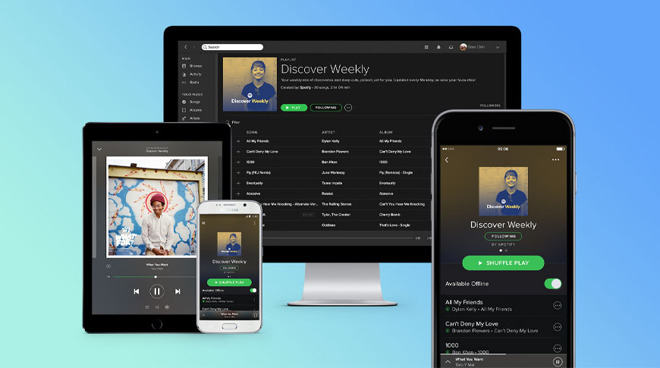Like Apple Music, Spotify now offers a three month premium trial
Spotify has extended the free-trial period it offers for Spotify Premium from one month to three, the default length of Apple's free trial for Apple Music.

Streaming giant Spotify is now offering three free months to anyone who has yet to try their service, according to a news post on their site.
"Beginning August 22, eligible users will receive the first three months on us for free when they sign up for any Spotify Premium plan," says Spotify in a statement about the new trial. "You'll unlock a world of on-demand access to millions of hours of audio content-- no matter when you sign up, winter, spring, summer, or fall."
The trial period currently only extends to individual and student plans and will roll out across Duo and Family in the coming months. The trial doesn't extend to Headspace or anyone who is billed directly through their carrier, with the exception of those in Japan, Australia, China, and Germany.
Apple has been offering free three-month trials to Apple Music since it's inception, though they may begin limiting their trial to one month. Apple had learned artists are wary of lengthy trial periods when Taylor Swift protested the three-month trial by withholding her album 1989 from the service. The protest earned artists the ability to be paid for track and album streams through the free trial period.
Students who sign up for Apple Music can get a free six-month trial by visiting Apple's Support Page. After the trial ends, students pay $4.99 a month to continue their subscription until graduation, which works out to be about half the price of a standard subscription.
Like most other paid music subscriptions, Spotify Premium offers users the ability to listen ad-free, download music to their device, create playlists, skip tracks, and toggle between devices when listening.

Streaming giant Spotify is now offering three free months to anyone who has yet to try their service, according to a news post on their site.
"Beginning August 22, eligible users will receive the first three months on us for free when they sign up for any Spotify Premium plan," says Spotify in a statement about the new trial. "You'll unlock a world of on-demand access to millions of hours of audio content-- no matter when you sign up, winter, spring, summer, or fall."
The trial period currently only extends to individual and student plans and will roll out across Duo and Family in the coming months. The trial doesn't extend to Headspace or anyone who is billed directly through their carrier, with the exception of those in Japan, Australia, China, and Germany.
Apple has been offering free three-month trials to Apple Music since it's inception, though they may begin limiting their trial to one month. Apple had learned artists are wary of lengthy trial periods when Taylor Swift protested the three-month trial by withholding her album 1989 from the service. The protest earned artists the ability to be paid for track and album streams through the free trial period.
Students who sign up for Apple Music can get a free six-month trial by visiting Apple's Support Page. After the trial ends, students pay $4.99 a month to continue their subscription until graduation, which works out to be about half the price of a standard subscription.
Like most other paid music subscriptions, Spotify Premium offers users the ability to listen ad-free, download music to their device, create playlists, skip tracks, and toggle between devices when listening.

Comments
Spotify has also been bleeding money since day one and it hasn't stopped as far as I know. As they get more users ever year, they end up losing even more money every year. This has been going on for what, 10 years? Lets throw in some more freebies. Investors keep giving them more money to keep their doors open. They're in the hole so deep, if they can even make a profit, they have bills to pay. Getting anything back from your Investment seems like a slim chance and if it happens, it'll be years down the road.
They're whole business rely's on something they have no control over, the MUSIC!!! At any time the prices could be jacked up even higher as they're greedy, and then what? There is nothing else really to rely on to keep their doors open.
I switched from Spotify, Simply because Spotify uses Ogg Vorbis and not Apple’s native AAC codec. When you use Bluetooth headphones, compression algorithms like MP3 or Spotify’s Ogg Vorbis will need to be decoded by the iPhone then encoded into another lossy algorithm (AAC) before being transmitted to your headphones.
Best use scenario for iPhone users you will want a pair of headphones compatible with the AAC codec, then you want an AAC or Apple Lossless (ALAC) music library as your source. This will provide the cleanest sound quality possible, free from compounded compression your music would otherwise suffer.
Even if you have aptX HD compatible headphones you are still getting compounded compression when you stream Spotify music. (does not apply to iPhone users )
Apple’s simplicity and near-universal compatibility in codecs is its biggest strength.
To me, even if you gave me a free premium Spotify account, I would still choose Apple Music, it's just a better choice!
On the iPhone, I believe any audio file is decoded, then re-encoded to pass via bluetooth.
Even Apple's AAC.
If you’re using a pair of AAC-compatible headphones, you’re theoretically getting no loss in audio quality from your stored AAC files (the iTunes standard) or streaming from the Apple Music service. Here is reference
Music decoded then through to the system mixer & out to be encoded AAC for the headphones.